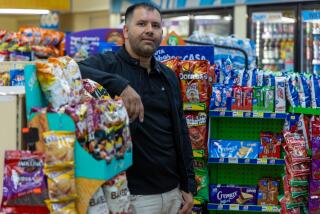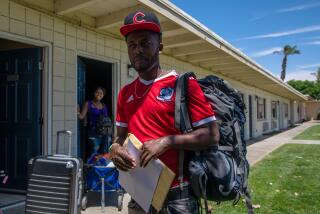Red Tape Untangled, Teen Refugee Red-Eyed After Seeing Family
- Share via
MUNICH, Germany — After five weeks of loneliness, hard luck and tears, Mentor Hoti on Thursday finally was reunited with his family.
After the 14-year-old refugee from Kosovo cleared customs at the airport here, he put on a brave face for his father and favorite brother, Basri. Each got a quick hug and a handshake.
But once Mentor arrived at the apartment to join the rest of his 11-member family, teen bravado failed him. Huge sobs shook his body. Tears coursed down his face. He wrapped his arms fiercely around one brother, then another.
His ordeal was over. “You don’t have to cry anymore,” said his father, Iliaz. “We’re all together again.”
But the 60-year-old father’s emotions betrayed him a moment later. His eyes turned red and watered.
“I’ve suffered a lot in my life,” he said. “I have been poor and I have been in war. But this--this was the worst thing I have ever felt.”
Added Mentor’s 45-year-old mother, Ajmane: “I never thought this day would really come.”
Neither did many aid workers. After a seemingly endless string of snafus by government officials, humanitarian agencies and even his family, Mentor had come to symbolize the thousands of ethnic Albanian refugee families split apart by the crisis and the tremendous bureaucratic obstacles blocking their reunification.
A shy, uneducated boy who spent much of his young life as a shepherd, Mentor was lost in a world completely beyond his understanding and seemingly indifferent to his plight.
“It’s a solved case. And with a solved case, there’s always relief,” said Caroline Spannuth, a U.N. refugee worker who turned Mentor’s situation into something of a personal crusade.
After North Atlantic Treaty Organization airstrikes began March 24, Mentor’s family fled toward Macedonia ahead of advancing Yugoslav forces.
After a week spent in a miserable, muddy valley straddling the Yugoslav-Macedonian border, Mentor ventured out to find food for the family. In the process, he tried to help a little girl who had fainted, carrying her out of a crowd to seek medical help.
But when he tried to rejoin his family, a Macedonian guard blocked him and put him on a bus to a refugee camp about 10 miles from the border with Kosovo, a southern province of Serbia, the dominant Yugoslav republic. He eventually wound up with distant relatives in a cramped, dank tent in one of the Balkans’ biggest camps.
His reunion with his family was blocked by a series of mishaps. First, Mentor’s family left for Germany without him. Then, Red Cross officials lost his file. Finally, the German Embassy in Skopje, the Macedonian capital, refused to make an exception for his case, forcing him to wait a week for a special visa.
“It’s absolutely unnecessary what happened,” Spannuth said.
Mentor’s final trek back to his family continued the pattern of administrative hassles. It began at 4:30 a.m. Wednesday when visitors woke him and didn’t end until about 29 hours later, when he finally arrived in the German city of Munich.
His luggage was a plastic grocery bag. Inside: a sweater, a notebook, a T-shirt and an English phrase book. He gave his only other possession, a warmup suit, to a friend in the camp.
As he said his goodbyes to the family with whom he has lived for five weeks, Mentor smiled repeatedly. For the first time in weeks, he seemed happy.
But the giddiness didn’t last long. The first disappointment came at the Skopje airport, when Macedonian border officials refused to let Mentor depart without a special visa stamp.
After the plane left without him, U.N. officials paid an emergency visit to high-ranking officials in Macedonia’s state police headquarters to get the visa. Three hours later, Mentor was back at the airport for a later flight to Munich.
This time, however, the travel agency had erred, booking a flight that would have stranded Mentor in another German city overnight. U.N. refugee officials said they couldn’t allow a minor to remain without care for such a long period of time.
U.N. and refugee workers huddled again, working two cellular phones at once to secure a flight to Germany. Finally, around 2 p.m., they found space on the day’s last flight to Munich, through the former Yugoslav republic of Slovenia, on a business-class ticket.
The last development led to several surreal scenes as Mentor, three weeks past his last bath and clad in a filthy blue hat and Fila sweatpants, sat down in the stuffed leather seats of the executive lounge among the laptops and business suits of the upper-class, Euro-businessman set.
After dining on the complimentary chocolate-covered raisins and fruit nectar, Mentor walked across the runway to take the first plane trip of his life. He covered his ears when the jet engines revved. As the plane lifted off, a broad smile crossed Mentor’s face. “Oh yes,” he said. “It’s loud like a tractor.”
But the happiness again was short-lived. Because of flight delays caused by bombing raids and the arrival of NATO Secretary-General Javier Solana in Macedonia, Mentor missed his connecting flight in Ljubljana, the Slovenian capital.
With no other flights left for the day, the airline offered to put Mentor up in a hotel. But another problem arose: Mentor had no visa to enter Slovenia. He would have to spend the night on the airport floor.
After a call to the Office of the U.N. High Commissioner for Refugees in Slovenia, a local police captain was persuaded to issue Mentor yet another special visa, allowing him to stay overnight in a hotel.
Finally, after a night spent in an Alpine-style inn, Mentor boarded the plane for Munich on Thursday morning.
As the flight dragged on, Mentor began squirming. By the time the plane landed, he nearly leaped out of his seat.
After his reserved reception at the airport, Mentor cracked a few times, only briefly, his eyes watering as he sat in the subway across from his father on the way to the family’s new lodging in Munich.
“In a way, I’m glad he was alone in the camps,” his father said. “I think he learned from it, and it made him more of a man.”
The family now lives in the converted offices of a film company, along with hundreds of refugees from all over the world.
It has two rooms in the complex, where children’s pictures coat the dirty, olive-green hallways. The room where the reunion took place is about 400 square feet and lighted by a single fluorescent tube. There are three bunk beds, a table and a refrigerator.
Still, Mentor said it was far better than his previous accommodations.
“Oh yes, much nicer,” he said.
His oldest sister, Xhevahire, apologized for her taciturn brother, saying he was overcome by emotion. “Now, his heart is full,” she said.
As his visitors turned to leave, Mentor was asked if he had any last words. He ducked his head for a moment, then looked up.
“Thank you,” he said.
(BEGIN TEXT OF INFOBOX / INFOGRAPHIC)
Young and Alone Mentor Hoti, 14, and his family were forced from their Kosovo home shortly after NATO launched its airstrikes March 24. After a week of waiting to cross the Macedonian border, he was separated from his family when he stopped to help a girl who had fainted. For previous reports on him, see The Times’ Web site at https://www.latimes.com/mentor.
More to Read
Sign up for Essential California
The most important California stories and recommendations in your inbox every morning.
You may occasionally receive promotional content from the Los Angeles Times.













